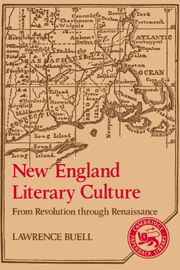Book contents
- Frontmatter
- Contents
- Acknowledgments
- Abbreviations of Frequently Cited Works
- PART I FOUR OVERVIEWS
- 1 Theoretical Premises
- 2 A Narrative Overview of New England's Literary Development
- 3 Marketplace, Ethos, Practice: The Antebellum Literary Situation
- 4 Neoclassical Continuities: The Early National Era and the New England Literary Tradition
- PART II THREE REPRESENTATIVE GENRES
- PART III REINVENTING PURITANISM: THE NEW ENGLAND HISTORICAL IMAGINATION
- Part IV NEW ENGLAND AS A COUNTRY OF THE IMAGINATION: THE SPIRIT OF PLACE
- Postscript
- Appendix Vital Statistics: A Quantitative Analysis of Authorship as a Profession in New England
- Notes
- Index
3 - Marketplace, Ethos, Practice: The Antebellum Literary Situation
Published online by Cambridge University Press: 15 October 2009
- Frontmatter
- Contents
- Acknowledgments
- Abbreviations of Frequently Cited Works
- PART I FOUR OVERVIEWS
- 1 Theoretical Premises
- 2 A Narrative Overview of New England's Literary Development
- 3 Marketplace, Ethos, Practice: The Antebellum Literary Situation
- 4 Neoclassical Continuities: The Early National Era and the New England Literary Tradition
- PART II THREE REPRESENTATIVE GENRES
- PART III REINVENTING PURITANISM: THE NEW ENGLAND HISTORICAL IMAGINATION
- Part IV NEW ENGLAND AS A COUNTRY OF THE IMAGINATION: THE SPIRIT OF PLACE
- Postscript
- Appendix Vital Statistics: A Quantitative Analysis of Authorship as a Profession in New England
- Notes
- Index
Summary
He was so enamoured of the spiritual beauty that he held all actual written poems in very light esteem in the comparison.
Ralph Waldo Emerson, “Thoreau” (1862)Genius … melts many ages into one, and thus effects something permanent, yet still with a similarity of office to that of the more ephemeral writer. A work of genius is but the newspaper of a century, or perchance of a hundred centuries.
Nathaniel Hawthorne, “The Old Manse” (1846)Chapters 1 and 2 took note of some of the economic and cultural factors that enabled New England's literature to develop. To enable, however, is not in itself to cause. Our charting of these developments only raises anew the question of why they should have culminated so successfully. From the early national standpoint, American literary emergence seemed bafflingly slow; but for us the question should rather be, How could America's classic literary works have been written at a time when the very concept of authorial vocation had hardly begun to crystallize?
This chapter will address the issue of how, at a time when American authors were ostensibly lagging behind their British counterparts, the best of them were able to compose works that today impress many readers not only as great literature but even as in some respects more modern than the masterpieces of Victorian fiction and poetry.
- Type
- Chapter
- Information
- New England Literary CultureFrom Revolution through Renaissance, pp. 56 - 83Publisher: Cambridge University PressPrint publication year: 1986



